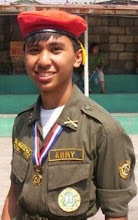by Manuel A. Rodriguez II
Why was I studying? For who or what was I sacrificing? Partly, it was that blind belief that my parents have instilled on my mind since I was a kid. Now that I am a grown-up I realized that what was instilled on me by my parents is a blind belief in learning upon which they both had placed such reliance. Please do not get me wrong on it, blind belief as it may be but it did helped me anyway in earning a Bachelor of Arts degree back in 2009 and I thank them for that and their support.
Studying, besides being a vague struggle to escape my inheritance (poverty), which is also the inheritance of many Filipinos, it was a manifestation of a fact that exists among our fellowmen, in which accomplishment becomes a fetish.
We Filipinos have been for so long under the control of foreign powers, who look down on us from what they deem to be their pretentious standards, that our own barely audible aspirations have been strained to search for any outlet no matter what. It did not matter that our knowledge, once acquired, would be exhausted in a cramped, repressed, unproductive society.
The degree was the thing; the honor was the objective; it lifted the Filipino of the past above the sweaty mass.
And yet, THAT WAS NOT MY PURPOSE. From the beginning I wanted to be a doctor. When I was in kindergarten I was inspired by then Secretary of the Department of Health who visited our school and promoted a government health program for the children like me. I and my classmates made him a thank you card because we enjoyed his visit on our school. I will never forget that man; his name is Doctor Juan Flavier.
Dr. Flavier became a senator years later after serving in DOH. Senator Flavier is now retired on public service and yet his visit on my kindergarten more than a decade ago is still very vivid in my memory. I once said to myself that I wanted to be a doctor like Doctor Juan is.
My grandmother whom we are fondly of calling “Nanay” told me stories from the barrios during wartime. There she said, the people died without tasting a medicine, died gradually, and with suffering. The “albularyos” were the tenet, muttering magic words over cancers, tuberculosis and beri-beri. Primarily, I was interested in pediatric medicine, to save the young.
There were many things to be enjoyed in one’s short life. Even while working hard at a field, a tired farmer would look up and notice the way a line of trees lifted at the horizon and he would think that life was good. At its most miserable there was still much in it that was enjoyable.
In the barrios according to my Nanay if a child died the people bowed and said: “It is the will of God,” as they had been taught by their parish. Even as a child listening to my Nanay, It was never my will to accept it that way.
Then afterwards, I thought of studying law. I would be a lawyer for the people particularly for the rural poor (those similarly situated with the wartime barrio people my Nanay told me), not one who prosecuted them in the courts and even used the statutes which sounded good to the advantage of the landlord and the consumerist. I would defend the people with all my honesty.
During election time I listened to the candidates. Every election whether national or barangay level it was the same. “The people this, the people that.” After campaign, the word “people” was stricken from the vocabularies of the winners, who sat on their polished chairs and collected both graft and salary, equally, with both hands, form the people.
The men I admired as I grew older were all simple men who had a genuine sympathy for the people. Senator Flavier is one, for his being a doctor to the barrios, Senator Jovy Salonga for his eloquence on his faith in the public sphere, Congressman Crispin Beltran for his fortitude in advancing the interest of the working class, the militancy of Bonifacio, Rizal and his dedication. I was impressed by Joan of Arc, Rizal, and Jesus Christ because they went to their deaths for what they believed, and their beliefs were common and of the people.
I had begun to arrive, in a small way, at a philosophy, “If you do it, make sure you’ll finish it and do it with all your heart. If what you will do will benefit many people, though it threatens your happiness and safety, sacrifice your happiness and safety for your noble purpose.”
Such philosophy is my answer to the question my faith had posed on me; “What Would Jesus Do?”
Initially due to the blind belief my parents have instilled, I was studying to escape the constricted confines of poor Filipinos, but my efforts only led me to the conviction that the poor Filipinos was all important, and that I was inferior to it.
GOD BLESS THE FILIPINO.
11/2/10
Studying for the People
Labels:
civil law,
doctor,
elections,
filipinos,
flavier,
graft,
Jesus,
jesus christ,
joan of narc,
law,
lawyer,
manny rodriguez,
manuel rodriguez,
medicine,
poverty,
salonga
Subscribe to:
Post Comments (Atom)

- Manuel A. Rodriguez II
- Professor of "The Humanities" at the Lyceum of the Philippines University. Law Student at the Far Eastern University, Institute of Law. President and former Auditor of Legal Network for Truthful Elections (UST Chapter) Former Vice President- Internal of Batas Tomasino: The UST Law Society, Former Chairperson of UST-Students' Democratic Party. Former Vice President- Internal of UST UNESCO. Former Public Relations Officer (PRO) of UST Arts and Letters Student Council. Former Vice President Internal of Community Achievers' Association (UST-AB). Bachelor of Arts in Legal Management (University of Santo Tomas, '09) High School Education (Christian Academy of Manila, '05)





No comments:
Post a Comment